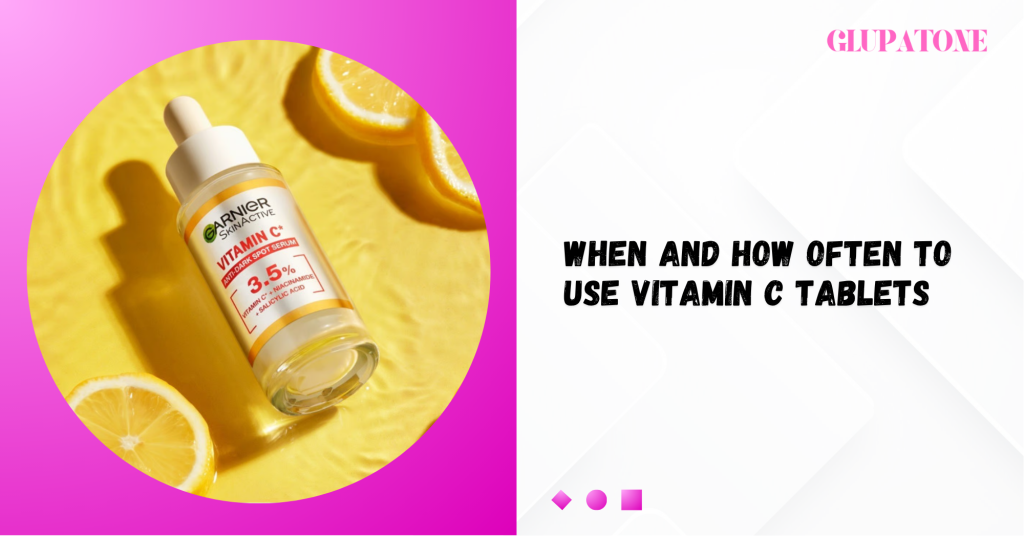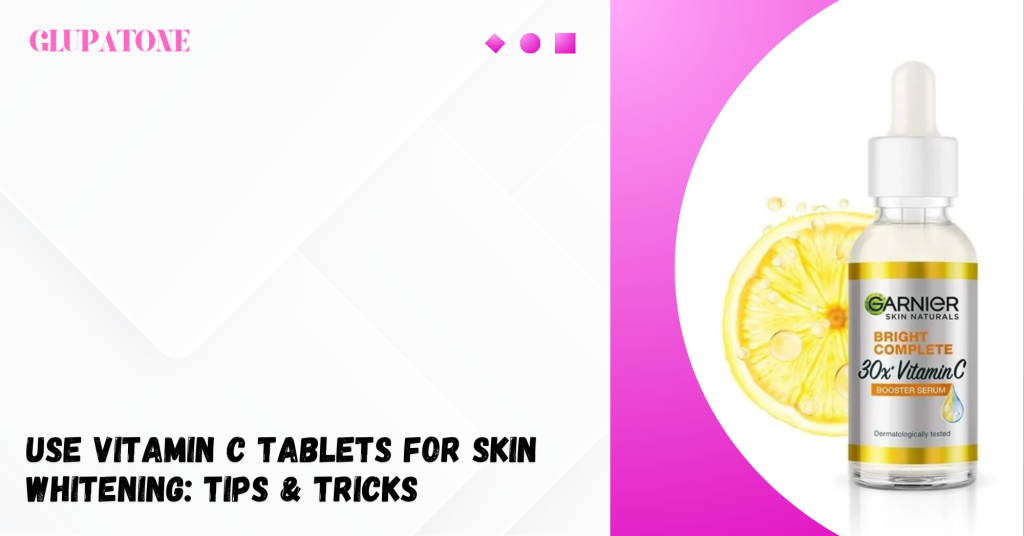Introduction to Vitamin C and Skin Whitening
Vitamin C is a powerful antioxidant widely used in skincare for its ability to promote brightness, fade pigmentation, and improve skin texture. Use Vitamin C Tablets For Skin Whitening, whether taken internally or applied topically, it’s a favorite ingredient among those looking to achieve a radiant, even-toned complexion.
Why Vitamin C Is Popular in Skincare
Vitamin C boosts the skin’s natural defense system, neutralizes free radicals, and stimulates collagen production—all of which help in making the skin look younger and clearer.
How It Works to Brighten and Even Skin Tone
It inhibits melanin production, which causes dark spots and uneven skin tone. Over time, Vitamin C can lighten hyperpigmentation and dullness, revealing brighter skin.
Note: While Vitamin C is generally safe, results can vary. Always consult with a skincare specialist before starting any new supplement or topical treatment.
Types of Vitamin C Tablets Used for Skin Whitening
Not all Vitamin C tablets are the same, and their effectiveness depends on the form and how they are used.
Oral Vitamin C Tablets
These are taken as dietary supplements and help improve skin brightness from within by enhancing collagen synthesis and protecting the skin from oxidative stress.
Crushable or Topical Tablets
Some Vitamin C tablets can be crushed and applied directly to the skin by mixing them with carrier liquids like rose water or aloe vera.
Choosing the Right Type for Your Needs
For internal support, look for ascorbic acid tablets with at least 500 mg per dose. For external application, pure, uncoated Vitamin C tablets are better suited.
Reveal a Brighter, More Radiant You—Experience Glupatone Today!
Glow Naturally! Achieve Even Skin Tone with the Power of Glupatone.
How Vitamin C Tablets Help in Skin Whitening
Vitamin C offers multiple benefits for the skin beyond just lightening dark spots.
Antioxidant Power and Collagen Boost
It protects the skin from sun damage and pollution while also encouraging new collagen formation, resulting in firmer, younger-looking skin.
Reducing Pigmentation and Dark Spots
Regular use—especially in combination with products like Glupatone Emulsion—can visibly reduce discoloration and even out the skin tone.
Supporting Overall Skin Health
Vitamin C supports healing, reduces inflammation, and enhances the skin’s ability to repair itself. When used alongside a brightening formula like Glupatone, the results are even more noticeable.
Ways to Use Vitamin C Tablets for Skin Brightening
You can take Vitamin C internally or apply it directly to the skin for targeted effects.
Taking Vitamin C Orally
Recommended Dosage and Timing
A common dosage is 500 mg once or twice daily. It’s best taken with meals to avoid stomach discomfort and enhance absorption.
Best Practices for Absorption
For better results, combine oral Vitamin C with a healthy diet and topical products like Glupatone that target pigmentation directly.
Skincare Note: Always consult a dermatologist if you are pregnant, have sensitive skin, or are using other actives like retinoids.
Topical Application Using Crushed Vitamin C Tablets
How to Make a DIY Vitamin C Paste or Serum
Crush one uncoated Vitamin C tablet and mix it with rose water or aloe vera gel to form a thin paste. Apply it evenly on clean skin and leave it on for 10–15 minutes before rinsing.
What to Mix With (e.g., rose water, aloe vera)
- Rose Water: Soothes and refreshes.
- Aloe Vera: Hydrates and calms sensitive skin.
- For added results, apply Glupatone Emulsion after rinsing to lock in moisture and extend the brightening benefits.
Combining Vitamin C Tablets with Glupatone
Vitamin C and Glupatone can make an excellent skin-brightening combo—if used correctly. While Vitamin C works internally and externally to lighten and protect, Glupatone adds targeted cosmetic support for visible results.
Can You Take Them Together?
Yes, many skincare routines safely include both oral Vitamin C supplements and Topical Glupatone Emulsion or Cream. The internal support from Vitamin C boosts collagen production and brightens the skin, while Glupatone addresses external concerns like pigmentation, dark spots, and dullness.
Note: Always consult with a dermatologist or skincare expert before starting any combined regimen—especially if you have sensitive skin or are taking other medications.
How Glupatone Cream and Oral Vitamin C Work as a Combo
- Vitamin C reduces oxidative stress, which leads to dark spots and uneven tone.
- Glupatone, with ingredients like Glutathione, Kojic Acid, and Vitamin C, works externally to enhance skin clarity and glow.
When used together:
- Oral Vitamin C boosts internal repair and immunity.
- Glupatone supports targeted brightening and hydration.
This two-sided approach promotes faster and more lasting results.
Timing and Routine Tips for Dual Use
To get the best out of both products, follow a simple routine:
- Morning
- Take your oral Vitamin C tablet with breakfast.
- Apply Glupatone cream or emulsion after cleansing and toning.
- Finish with broad-spectrum sunscreen.
- Take your oral Vitamin C tablet with breakfast.
- Night
- Cleanse skin thoroughly.
- Optionally apply crushed Vitamin C tablet paste (2–3 times/week).
- Apply Glupatone cream to lock in moisture and promote overnight repair.
- Cleanse skin thoroughly.

When and How Often to Use Vitamin C Tablets
Daily Use Recommendations
For most people, 500 mg per day is an effective starting point. If tolerated well, some dermatologists may recommend up to 1000 mg daily, split into two doses.
Avoid taking high doses without supervision, especially if you’re pregnant, breastfeeding, or have kidney conditions.
Always follow a doctor’s guidance for supplement intake.
How Long Before You See Results
Skin lightening and brightening typically take time. With consistent use of both Vitamin C tablets and Glupatone:
- Mild brightening: ~2 weeks
- Visible spot reduction: 3–4 weeks
- Even tone and glow: 6–8 weeks
Results may vary depending on your skin type, sun exposure, and how well you maintain your routine.
Safety Tips and Precautions
While generally safe, both Vitamin C and Glupatone products should be used responsibly.
Side Effects and Overuse Warnings
- Oral Vitamin C: Can cause stomach upset or diarrhea in high doses.
- Topical Vitamin C or Glupatone: May cause tingling, dryness, or mild irritation, especially if overused.
Start slow and always perform a patch test before applying to your face.
Who Should Avoid High-Dose Vitamin C
- People with kidney disorders (especially those prone to kidney stones)
- Individuals taking medications for heart conditions or cancer
- Anyone with a known Vitamin C sensitivity
If unsure, seek a licensed skincare advisor or doctor’s opinion before beginning treatment.
Expected Results and Timeline
Patience and consistency are key when using Vitamin C tablets for skin brightening—whether used orally or topically alongside Glupatone.
How Quickly Skin Tone May Improve
Most people start to notice:
- A slight glow within 7–10 days
- Visible reduction in dark spots and dullness in 3–4 weeks
- Smoother, more even-toned skin in 6–8 weeks
Results may vary depending on lifestyle, sun exposure, dosage, and how regularly you apply Glupatone.
For best results, pair Vitamin C tablets with Glupatone cream or emulsion, especially if you’re targeting pigmentation and uneven tone.
Signs That It’s Working
You’ll know it’s working if:
- Your skin looks brighter and more radiant
- You notice reduced hyperpigmentation
- Skin feels smoother and more hydrated
Keep in mind: Overusing crushed Vitamin C topically can sometimes irritate the skin—so always follow proper guidelines and monitor your skin’s response.
Natural Alternatives to Vitamin C Tablets
If tablets aren’t your preference, there are natural and topical alternatives that still support brightening.
Using Fruits or Serums Instead
- Eat Vitamin C-rich fruits like oranges, strawberries, and kiwis
- Apply Vitamin Serums enriched with stabilized forms like ascorbic acid
These options can be used alongside Glupatone, enhancing its effects without overloading your skin.
Why Glupatone Is a Trusted Skin Brightening Option
Glupatone contains:
- Glutathione, a master antioxidant known for its skin-lightening effects
- Vitamin C and Kojic Acid, which boost glow and fade dark spots
- A dermatologically balanced formula, suitable for both daily and long-term use
Unlike home remedies, Glupatone delivers consistent, clinically-backed results with minimal effort—ideal when used with lifestyle changes or internal support like Vitamin C tablets.
Always consult a skincare professional before combining treatments or switching routines, especially if you have sensitive skin or underlying conditions.
Illuminate Your Beauty—Start Your Skin Brightening Journey with Glupatone.
Target Hyperpigmentation at Its Core—Glupatone Does the Work While You Glow!
Conclusion: Should You Use Vitamin C Tablets for Whitening?
Combining Vitamin C tablets with Glupatone can be a smart move for anyone looking to safely improve their skin tone over time.
Pros and Cons of Using Tablets
Pros:
- Boosts internal antioxidant levels
- Supports collagen production and immune health
- Affordable and easy to access
Cons:
- May cause stomach discomfort in high doses
- Topical use (crushed tablets) can irritate the skin
- Not a substitute for professional skincare
Balancing Supplements with Proper Skincare Like Glupatone
The most effective routine combines:
- Internal support via Vitamin C
- External care with Glupatone products
- Consistent hydration, sun protection, and cleansing
Pro tip: Think of Vitamin C as the “supporting role” and Glupatone as the “main hero” in your brightening journey.
Frequently Asked Questions (FAQs)
Can I apply crushed Vitamin C tablets directly on my face?
Yes, but do so carefully. Crush the tablet finely, mix with a gentle base like aloe vera or rose water, and patch test first. For convenience and safety, Glupatone cream may be a better alternative.
How many mg of Vitamin C should I take daily for skin?
Typically 500–1000 mg daily is safe. Always ask your doctor for personal recommendations.
Is Vitamin C safe to use with Glupatone cream?
Yes. They work well together, especially when taken at different times (e.g., Vitamin C in the morning, Glupatone at night).
How long does it take to whiten skin using Vitamin C?
About 4 to 8 weeks with consistent use. Using Glupatone alongside can speed up visible results.
Can I use sunscreen after applying Vitamin C?
Absolutely. In fact, it’s recommended. Sunscreen protects your skin and boosts the effectiveness of both Vitamin C and Glupatone.
Are Vitamin C tablets good for acne-prone skin?
Yes, as long as they’re taken orally or used topically with care. They reduce inflammation and improve skin tone.
Can men use Vitamin C tablets for skin brightening?
Yes! Both men and women can benefit from this routine, especially when combined with Glupatone for targeted care.
Read More:

